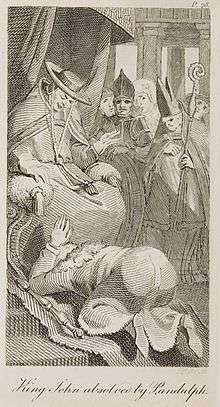Pandulf Verraccio
Pandulf Verraccio (died 16 September 1226), whose first name may also be spelled Pandolph or Pandulph (Pandolfo in Italian), was a Roman ecclesiastical politician, papal legate to England and bishop of Norwich.[1] Pandulf was born in Rome, and first came to England in 1211, when he was commissioned by Innocent III to negotiate with King John.[1] He is often erroneously called Cardinal Pandulph or Pandulph Masca due to being confused with Cardinal Pandolfo da Lucca,[2] who himself was confused with Cardinal Pandulf of Pisa and erroneously given the Pisan family name Masca. His authentic surname may be rendered Verraccio, Verracchio or Verracclo.
Pandulf Verraccio | |
|---|---|
| Bishop of Norwich | |
 | |
| Appointed | 1215 |
| Term ended | 16 September 1226 |
| Predecessor | John de Gray |
| Successor | Thomas Blunville |
| Other posts | sometime papal legate |
| Orders | |
| Consecration | 29 May 1222 |
| Personal details | |
| Born | Rome, Papal States |
| Died | 16 September 1226 Rome, Papal States |
| Buried | Norwich, England |
| Denomination | Roman Catholic |
Obtaining no satisfactory concessions, Pandulf is said to have produced the papal sentence of excommunication in the very presence of the king. In May 1213 he again visited England to receive the king's submission. The ceremony took place at the Templar church at Dover, and on the following day John, of his own motion, formally surrendered England to the representative of Rome to receive it again as a papal fief.[1]
Pandulf repaid this act of humility by using every means to avert the threatened French invasion of England. For nearly a year he was superseded by the cardinal-legate Nicholas of Tusculum; but returning in 1215 was present at the conference of Runnymede, when the Magna Carta was sealed. He rendered valuable aid to John who rewarded him with the see of Norwich, England in 1215, however he was not consecrated for a number of years.[3][4] The arrival of the cardinal-legate Gualo in 1216 relegated Pandulf to a secondary position; but after Gualo's departure in 1218 he came forward once more,[1] after having been appointed papal legate again on 1 September 1218.[4]
As representing the pope Pandulf claimed a control over Hubert de Burgh and the other ministers of the young Henry III; and his correspondence shows that he interfered in every department of the administration. His arrogance was tolerated while the regency was still in need of papal assistance; but in 1221 Hubert de Burgh and the primate Stephen Langton successfully moved the pope to recall Pandulf and to send no other legate a latere (of the highest rank) in his place. His legatine commission was terminated by the summer of 1221.[4] He was finally consecrated bishop on 29 May 1222.[3]
Pandulf retained the see of Norwich, but from this time drops out of English politics. He died in Rome on 16 September 1226,[3] but his body was taken to Norwich for burial.[1]
Citations
-

- Herbermann, Charles, ed. (1913). . Catholic Encyclopedia. New York: Robert Appleton Company.
- Fryde, et al. Handbook of British Chronology p. 261
- British History Online Bishops of Norwich Archived 2012-02-14 at the Wayback Machine accessed on 29 October 2007
References
- British History Online Bishops of Norwich accessed on 29 October 2007
- Fryde, E. B.; Greenway, D. E.; Porter, S.; Roy, I. (1996). Handbook of British Chronology (Third revised ed.). Cambridge: Cambridge University Press. ISBN 0-521-56350-X.
- Vincent, Nicholas (1995). "The Election of Pandulph Verracclo as Bishop of Norwich (1215)". Historical Research. 68: 143–63. doi:10.1111/j.1468-2281.1995.tb01997.x.
- Vincent, Nicholas (2004). "Pandulf (d. 1226)". Oxford Dictionary of National Biography. Oxford University Press. Retrieved 12 December 2015.
| Catholic Church titles | ||
|---|---|---|
| Preceded by John de Gray |
Bishop of Norwich 1215–1226 |
Succeeded by Thomas Blunville |